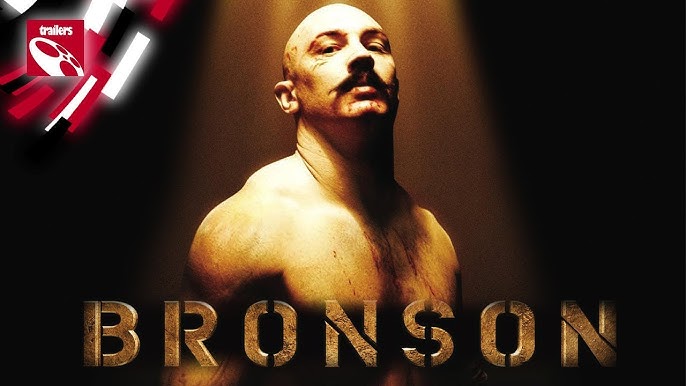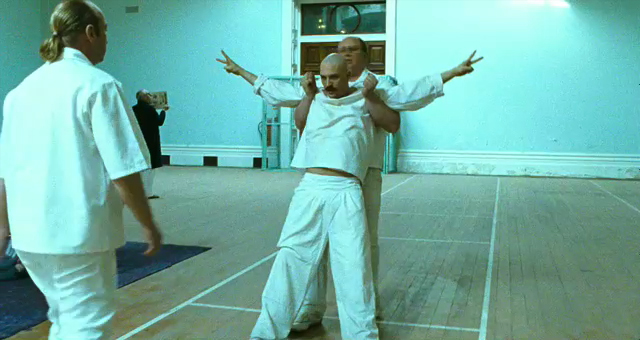Bronson (2008)

Bronson (2008) is a British biographical drama about the notorious prisoner Michael Peterson, who later became known by the name Charles Bronson. Directed by Nicolas Winding Refn, the film is based on a screenplay written by Refn and Brock Norman Brock. Tom Hardy delivers a compelling performance as Bronson, a man whose violent tendencies and unpredictable behavior made him one of the most infamous prisoners in British history. With its bold direction, intense performances, and thought-provoking themes, Bronson is a gripping exploration of identity, violence, and the human psyche.
The story of Bronson follows the life of Michael Peterson, a man who was first imprisoned in 1974 at the age of 19 for a petty crime. However, it was his violent outbursts, constant confrontations with prison guards, and his propensity for mayhem that transformed him into the infamous Charles Bronson. The film does not follow a conventional narrative structure, instead using a series of stylized sequences that mix drama, dark humor, and surreal moments. These elements reflect Bronson’s chaotic mental state and his constant struggle for attention, recognition, and power within the prison system.
Tom Hardy’s portrayal of Charles Bronson is nothing short of extraordinary. Hardy immerses himself in the role, capturing Bronson’s larger-than-life personality, brutal aggression, and underlying vulnerability. His physical transformation and commitment to the character are evident throughout the film, as he portrays Bronson with a mixture of menace and tragic self-awareness. Hardy’s performance anchors the film, with his captivating screen presence drawing the audience into Bronson’s disturbed world. His ability to switch between violent outbursts and moments of introspection adds layers to the character, making Bronson a complex figure rather than a mere villain.

The film’s direction by Nicolas Winding Refn is bold and experimental, using unconventional storytelling techniques to highlight the psychological depth of the character. Refn employs a series of dramatic monologues by Bronson himself, with the character often breaking the fourth wall and speaking directly to the audience. This approach gives the film a theatrical quality and invites viewers into Bronson’s mind. The use of vibrant colors, striking visuals, and intense sound design further intensifies the film’s surreal atmosphere, making Bronson an unsettling yet visually captivating experience. Refn’s direction ensures that the film is not just a straightforward biographical drama but a unique cinematic journey into the psyche of a man consumed by violence and a desperate need for recognition.

The themes of violence, identity, and the search for meaning are central to Bronson. The film portrays how Bronson’s violent outbursts are not just a result of his nature but also a manifestation of his deep-seated desire for attention and respect. Throughout the film, Bronson repeatedly states that he is an artist, a performance artist, using violence as his medium. His constant desire to be seen and acknowledged leads to his transformation into a living legend within the prison system, but it also causes his mental and physical deterioration. The film forces the audience to question the nature of identity and what drives individuals to act out in extreme ways.

In addition to the exploration of Bronson’s violent nature, the film also touches on his vulnerability and the impact of his upbringing. Raised in a working-class family, Bronson’s early years were marked by neglect, bullying, and a lack of emotional support. His transformation into the infamous Charles Bronson can be seen as a response to these formative experiences. The film suggests that Bronson’s need for power and attention stems from a deep insecurity and a desire to prove his worth to the world. This exploration of his past gives the film emotional depth and adds a layer of tragedy to the character’s actions.

In conclusion, Bronson is a raw and intense film that delves into the complexities of violence, identity, and the human psyche. With Tom Hardy’s exceptional performance, Nicolas Winding Refn’s bold direction, and the film’s thought-provoking themes, Bronson offers a gripping portrayal of one of Britain’s most infamous prisoners. It challenges the audience to think critically about the factors that shape individuals and the ways in which they seek meaning in their lives. Bronson is not just a story about a violent criminal; it is a meditation on the destructive nature of fame, the search for self-worth, and the limits of personal identity.











